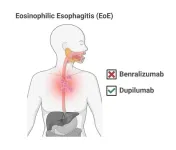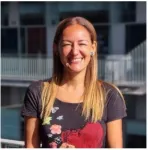(Press-News.org) Despite high hopes, a drug that wipes out the namesake cell type associated with the disease eosinophilic esophagitis (EoE) doesn’t make patients feel better and doesn’t reverse tissue damage in their throats.
Meanwhile, data show that a different drug that had previously been approved for use in adults and teens with EoE is also safe and effective for children under 12 who weigh at least 15 kg (about 33 pounds).
The results of these clinical trials—plus an accompanying editorial—appear in the June 17, 2024, edition of The New England Journal of Medicine.
“Together, these trials provide exciting advances in our understanding of, and treatment options for, this increasingly common and perplexing disease,” writes Benjamin Wright, MD, an allergist-immunologist with The Mayo Clinic in Phoenix, AZ.
Long-time EoE expert Marc Rothenberg, MD, PhD, and colleagues at Cincinnati Children’s were deeply involved in both studies.
What is EoE?
This severe form of food allergy occurs in an estimated 180,000 people in the United States, including at least 21,000 children under 11. For those affected, a variety of foods can trigger a powerful immune response. Patients can experience painful throat inflammation, tissue damage, and difficulty swallowing. When not controlled, the ongoing disruption to a healthy diet can limit a child’s growth and lead to other complications.
The most distinguishing feature of EoE has been a well-documented spike in the number of eosinophils – a type of white blood cell – found in the throat. For many years this surge of immune cells also was believed to be the primary cause of the disease.
New findings from the Phase 3 MESSINA clinical trial add to a body of evidence suggesting otherwise.
Effective but not helpful
This study evaluated a monoclonal antibody treatment called benralizumab, which has been shown in other studies to be highly effective at reducing unwanted eosinophils. Somewhat like an exploding paint capsule making it easier for cops to catch a bank robber, the antibody binds to eosinophil cells and exposes them to patrolling natural killer cells.
In fact, this treatment has been approved for treating poorly controlled asthma because it helps break a feedback cycle of eosinophil-mediated hyperreaction and mucus production in inflamed airways. That asthma success inspired many scientists to hope that benralizumab would become a difference-maker in treating EoE.
But when tested in 211 patients with EoE—ages 12 to 65—people still experienced inflammation, difficulty swallowing, pain, and reduced quality of life. This occurred despite more than 80% of those taking benralizumab showing “near-complete depletion” of eosinophils in their blood and esophagus. Further, microscopic exams of tissue samples showed no significant improvement at a biological level.
“This trial calls into question the clinical relevance of monitoring EoE for treatment effect solely on the basis of the degree of eosinophilic inflammation,” says Rothenberg. "The MESSINA study highlights the importance of research as it was a very reasonable assumption that eosinophilic esophagitis would be caused by eosinophils. Based on these new results, we now know that this assumption is primarily incorrect."
Rothenberg, who directs the Division of Allergy and Immunology at Cincinnati Children's, served as corresponding author for the study. Evan Dellon, MD, MPH, with the University of North Carolina at Chapel Hill, was co-first author.
Extended approval for dupilumab
Benralizumab targets the activity of interleukin-5 (one of several proteins involved in our bodies’ immune response). But other research has shown better results against EoE by targeting two other interleukins at the same time: IL-4 and IL-13.
The US Food and Drug Administration initially approved the drug dupilumab for treating EoE in 2022, but only for adults and teens. Based on data from a more recent clinical trial focusing on younger children, the FDA acted in January 2024 to extend approval to children aged 1 to 12 who weigh at least 15 kg (about 33 pounds).
The data and related findings that supported that decision also were published in NEJM on June 27.
To date, dupilumab is the only FDA-approved medication that precisely treats EoE in children.
Years of research producing results
Rothenberg and Margaret Collins, MD, Division of Pathology and Laboratory Medicine at Cincinnati Children’s, were co-authors on both studies published in the NEJM. They have been studying EoE for decades and have been active since the early days in evaluating both drugs.
Julie Caldwell, PhD, Division of Allergy and Immunology at Cincinnati Children’s, was a co-author on the benralizumab study.
What’s next for doctors, researchers and people with EoE?
In the short term, Rothenberg says that patients should consider dupilumab, but not benralizumab, or continue (or return to) other treatments that have been helpful. Dietary elimination therapy to avoid offending food triggers has been used for years but can be tough to follow. Various medications have helped some patients manage symptoms, including proton-pump inhibitors and steroid treatments. A few newer approaches are still being studied in other clinical trials.
Longer term, Rothenberg and other scientists are looking farther “upstream” from eosinophils in the body’s natural cascade of immune system responses to find other ways to stop, slow, or prevent the damage caused by EoE.
Until such work produces new options, Rothenberg also recommends that clinicians rely less upon eosinophil levels as the sole feature to gauge the severity of EoE. Other tests such as endoscope exams and collecting tissue samples for microscope analysis appear more likely to provide meaningful information.
“We need a more relevant biomarker to measure clinical response in eosinophilic esophagitis,” Rothenberg says. “That is certainly one of our main research goals as we move forward.”
About these studies
The MESSINA clinical trial was supported by AstraZenica. The dupilumab clinical trial was supported by Sanofi and Regeneron Pharmaceuticals.
END
Two studies shows mixed progress against EoE
Experts at Cincinnati Children’s play key roles in one trial that supports dupilumab use for children under 12 and another study showing no relief for people taking benralizumab. Both studies appear in The New England Journal of Medicine.
2024-06-27
ELSE PRESS RELEASES FROM THIS DATE:
Specific bacteria in your gut are involved in compulsive eating and obesity
2024-06-27
Vienna, Austria: An international team of researchers has identified specific bacteria in the gut that are associated with both mice and humans developing an addiction to food that can lead to obesity. They have also identified bacteria that play a beneficial role in preventing food addiction.
The research is presented today (Thursday) at the Federation of European Neuroscience Societies (FENS) Forum 2024 and is published simultaneously in the journal Gut [1,2].
Professor Elena Martín-García, from the Laboratory of Neuropharmacology-NeuroPhar in the Department of Medicine and Life Sciences at the Universitat ...
More than a quarter of ‘healthy’ over-60s have heart valve disease, according to new research
2024-06-27
Almost 4,500 healthy and symptom-free over-60s were examined, with 28pc found to have heart valve disease
Age was found to be strongly associated with an increased incidence of significant heart valve disease
Study lays the foundation for more research into the potential role of screening in the elderly population
Peer-reviewed – Prospective Cohort Study - People
The sheer scale of undiagnosed heart valve disease in our ageing population has been revealed for the first ...
Sylvester Cancer Tip Sheet - June 2024
2024-06-26
BLOOD CANCER
Sylvester Expert Endorses FDA’s Recent Cancer Drug Approval
Mikkael Sekeres, M.D., chief of the Division of Hematology at Sylvester, who specializes in treating leukemia and myelodysplastic syndromes (MDS), expressed his support for the Food and Drug Administration’s recent approval of the drug imetelstat. The drug, a telomerase inhibitor, treats cancer-related anemia in patients with lower-risk MDS. “With approval of imetelstat to treat myelodysplastic syndromes, we finally have another approach ...
Playing youth sports linked to better mental health in adults
2024-06-26
COLUMBUS, Ohio – Adults who continuously played organized sports through their youth have fewer symptoms of anxiety and depression than those who never played or those who dropped out, a new study finds.
And those who dropped out of sports had poorer mental health than those who never played at all.
But many more people drop out of youth sports than play continuously until they are 18, said Chris Knoester, senior author of the study and professor of sociology at The Ohio State University.
“If you play and stick with sports, it’s ...
Researchers find genetic stability in a long-term Panamanian hybrid zone of manakins
2024-06-26
We often think of species as separate and distinct, but sometimes they can interbreed and create hybrids. When this happens consistently in a specific area, it forms what’s known as a hybrid zone. These zones can be highly dynamic or remarkably stable, and studying them can reveal key insights into how species boundaries evolve—or sometimes blur. In a new study published in Evolution, researchers at the University of Illinois Urbana-Champaign describe a hybrid zone between two manakin species in Panama that ...
Special Issue of Applied Biosafety focuses on synthetic genomics
2024-06-26
In its first special issue on Biosafety and Biosecurity Considerations of Synthetic Genomics, the first part of a two-part special issue of the peer-reviewed journal Applied Biosafety focuses on the growing availability of customizable nucleic acid sequences and genomes from commercial sources. The issue also describes the advancements in desktop synthesis devices that enable the creation of on-demand nucleic acids. Click here to read the special issue now.
The rapid technological advancements described in part one of this two-part special issue are raising concerns among biosecurity experts and policymakers. The manuscripts in this issue explore the challenges, opportunities, and ...
Simple new process stores CO2 in concrete without compromising strength
2024-06-26
By using a carbonated — rather than a still — water-based solution during the concrete manufacturing process, a Northwestern University-led team of engineers has discovered a new way to store carbon dioxide (CO2) in the ubiquitous construction material.
Not only could the new process help sequester CO2 from the ever-warming atmosphere, it also results in concrete with uncompromised strength and durability.
In laboratory experiments, the process achieved a CO2 sequestration efficiency of up to 45%, meaning that nearly ...
Osiris 39 examines the role of disability in the history of science
2024-06-26
Disability studies has gained prominence in recent years, transforming fields ranging from design to literary studies with insurgent approaches to access and representation. The newest volume of Osiris, “Disability and the History of Science,” extends this movement to ask how disability has been a central, if unacknowledged, force in the scientific disciplines and the history of science. The volume examines the many roles that disability and disabled people have played throughout the history of science, calling attention to the shaping of scientific knowledge production by disability.
Editors Jaipreet Virdi, Mara Mills, and Sarah F. Rose, in their introduction ...
AI-based Alphafold: Its potential impact on predictive medicine
2024-06-26
AlphaFold is an outstanding example of artificial intelligence’s computational capabilities in accurately predicting intricate protein structures. A new Review article explores AlphaFold’s recent advancements and its potential impact on predictive medicine. The article is published in the peer-reviewed journal AI in Precision Oncology. Click to read the articles now.
Vivek Subbiah, MD, from the Sarah Cannon Research Institute, and coauthors, describe a shift toward predictive medicine, in which AI, integrated with genomic data, ...
A heart of stone: Study defines the process of and defenses against cardiac valve calcification
2024-06-26
CHAMPAIGN, Ill. — The human body has sophisticated defenses against the deposition of calcium minerals that stiffen heart tissues, researchers at the University of Illinois Urbana-Champaign and collaborators at UCLA Health and the University of Texas at Austin found in a new study that provides the first detailed, step-by-step documentation of how calcification progresses.
“Heart disease is the leading killer annually — about 18 million deaths per year — and that number is growing. A large proportion is the result of calcification,” said study leader Bruce Fouke, a U. of I. professor of earth ...
LAST 30 PRESS RELEASES:
Scientists discover why we know when to stop scratching an itch
A hidden reason inner ear cells die – and what it means for preventing hearing loss
Researchers discover how tuberculosis bacteria use a “stealth” mechanism to evade the immune system
New microscopy technique lets scientists see cells in unprecedented detail and color
Sometimes less is more: Scientists rethink how to pack medicine into tiny delivery capsules
Scientists build low-cost microscope to study living cells in zero gravity
The Biophysical Journal names Denis V. Titov the 2025 Paper of the Year-Early Career Investigator awardee
Scientists show how your body senses cold—and why menthol feels cool
Scientists deliver new molecule for getting DNA into cells
Study reveals insights about brain regions linked to OCD, informing potential treatments
Does ocean saltiness influence El Niño?
2026 Young Investigators: ONR celebrates new talent tackling warfighter challenges
Genetics help explain who gets the ‘telltale tingle’ from music, art and literature
Many Americans misunderstand medical aid in dying laws
Researchers publish landmark infectious disease study in ‘Science’
New NSF award supports innovative role-playing game approach to strengthening research security in academia
Kumar named to ACMA Emerging Leaders Program for 2026
AI language models could transform aquatic environmental risk assessment
New isotope tools reveal hidden pathways reshaping the global nitrogen cycle
Study reveals how antibiotic structure controls removal from water using biochar
Why chronic pain lasts longer in women: Immune cells offer clues
Toxic exposure creates epigenetic disease risk over 20 generations
More time spent on social media linked to steroid use intentions among boys and men
New study suggests a “kick it while it’s down” approach to cancer treatment could improve cure rates
Milken Institute, Ann Theodore Foundation launch new grant to support clinical trial for potential sarcoidosis treatment
New strategies boost effectiveness of CAR-NK therapy against cancer
Study: Adolescent cannabis use linked to doubling risk of psychotic and bipolar disorders
Invisible harms: drug-related deaths spike after hurricanes and tropical storms
Adolescent cannabis use and risk of psychotic, bipolar, depressive, and anxiety disorders
Anxiety, depression, and care barriers in adults with intellectual and developmental disabilities
[Press-News.org] Two studies shows mixed progress against EoEExperts at Cincinnati Children’s play key roles in one trial that supports dupilumab use for children under 12 and another study showing no relief for people taking benralizumab. Both studies appear in The New England Journal of Medicine.






